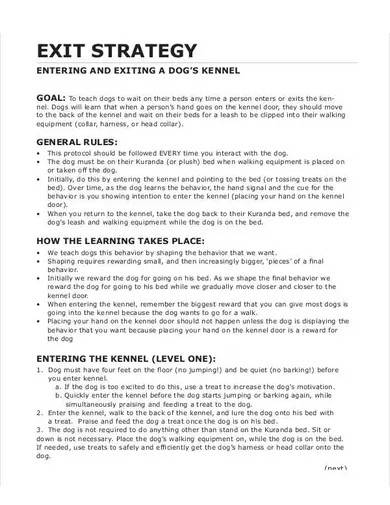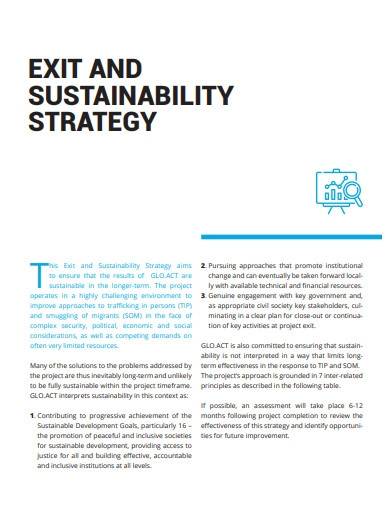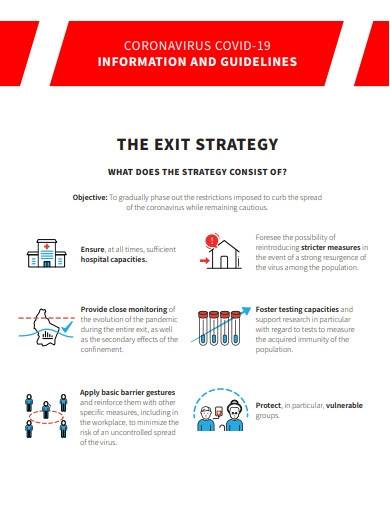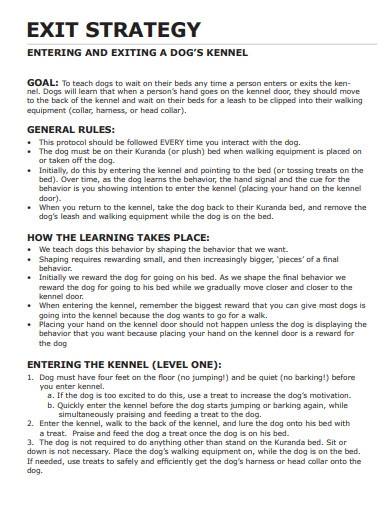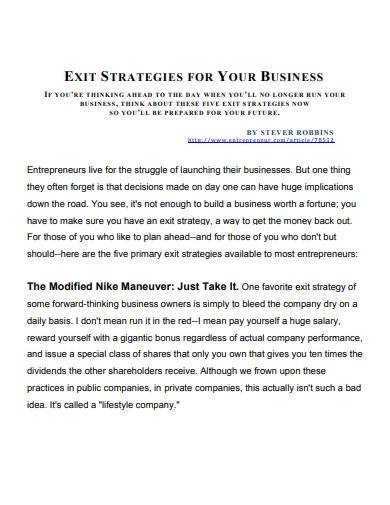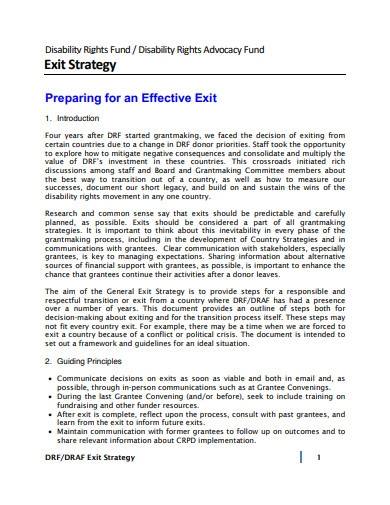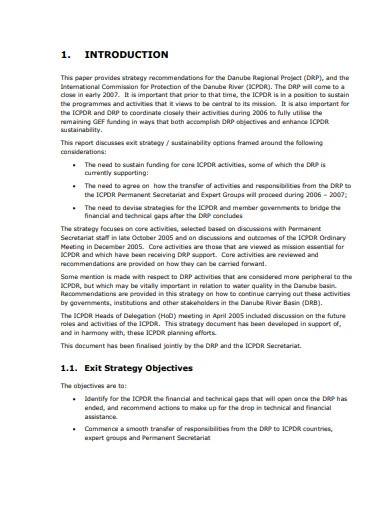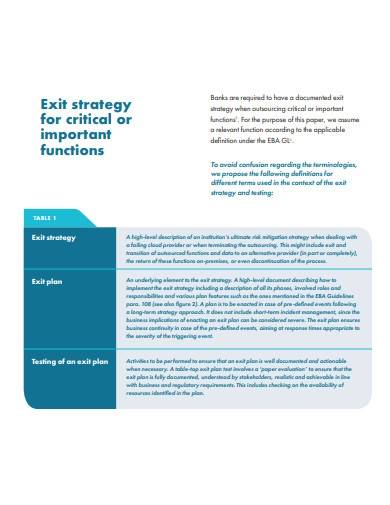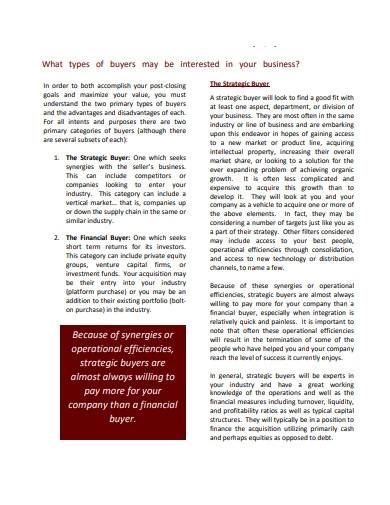Do you want to stop managing your business? Or does your business seem to not operate well? What helpful strategies that will guide you to minimize damages? To answer these questions, you need to have adequate knowledge about strategic planning, especially when it comes to exit strategy. But what if you are not yet fully knowledgeable about this matter? In this article, we are glad to help you gain insight for your successful exit with the use of our guide and downloadable plan samples. Keep on reading!
1. Exit Strategy Template
2. Exit and Sustainability Strategy
3. Business Exit Strategy Template
4. Covid-19 Exit Strategy Template
5. Sample Exit Strategy Format
6. Exit Strategies for Business
7. Simple Exit Strategy Template
8. Sample Project Exit Strategy
9. Basic Exit Strategy Template
10. Formal Exit Strategy
11. Standard Exit Strategy Template
What is an Exit Strategy?
The book “Early Exits: Exit Strategies for Entrepreneurs and Angel Investors” explains that an exit strategy is a vital management tool that has the purpose of helping an owner of a commercial organization or company to properly exit in the business industry. It should be built into the structure of the company from its earliest days. It appears to be a prerequisite to defining the practical way to finance the company.
How to Write an Exit Strategy
When your business is ready for angel investment, you should need to have a clearly articulated exit strategy and plan. Typically, many entrepreneurs out there haven’t openly express their exit strategy as they acquire financing from venture capital investors.
Thus, use this plan as a guide to prevent you and your business from having potential financial damages in the future.. In this section, we provide some valuable tips that you should think consciously in developing your own plan:
1. Determine your company’s financial value and salability
As you start developing an exit strategy, you need to to prepare an accurate account of your finances, both personally and professionally. How will you determine your company’s value and salability? You need to examine your company’s historical financial reports.
To do this, add up the value of everything the business has such as all equipment and inventory and subtract any liabilities and debts of your business. Using the balance sheet of your company is a great way to determine the financial worth of your business.
2. Consider different options according to your needs
There are many options of exit strategies such as an exit through a management buyout (MBO), family succession, franchising, a public flotation route, sell through a trade sale or a close down. Think carefully on several different exit strategies to determine your best option.
If you feel that time finally comes to transfer the business on to an heir, your exit option is a family succession. Or if you need to exit your business because it is insolvent, your exit route will be through liquidation.
3. Discuss with your investors
Start a thorough discussion and have an agreement with your investors and stakeholders as you share your intent to exit the business in a certain period of time. Develop an effective strategy that clearly conveys your suggestions and recommendations to the investors on how they will be repaid.
4. Appoint the new leader
After finishing your discussion and making decisions with key individuals of your company, it’s now the time for you to select wisely in appointing the new leader or owner of your business. Before you start transferring some of your responsibilities to new leadership, inform your employees about this matter and then you can now finalize your plans.
FAQs
The 5 exit strategies are liquidation, liquidation over time, keeping your business in the family, selling your business to managers or employees, and selling the business in the open market.What are the 5 exit strategies?
Some examples of exit strategies are being acquired by another company, the sale of equity, or a management or employee buyout.What are some examples of exit strategy in business?
An exit strategy provides a business owner a method to reduce or liquidate his stake in a business. If the business is successful, create a considerable profit. If the business is not successful, an exit strategy or exit plan allows the entrepreneur to minimize losses.Why have an exit strategy?
Therefore, avoid thinking in delaying your exit planning. Most business owners think that they are too young or they will not be selling their business for several years. However, it is never too early to begin planning, specifically with regard to structural, continuity, and risk management issues. You’ll never know what might happen to you or your business partners or shareholders. To assist you in your journey, you can learn and apply the tips mentioned here. Plus, you can download our samples in this article.
Related Posts
FREE 20+ Restaurant Business Plans in PDF MS Word | Pages ...
FREE 17+ Sample Blank Ticket Templates in AI InDesign | MS ...
FREE 16+ Sign Up Sheet Samples in Google Docs MS Word ...
FREE 10+ Sample Raffle Sheet Templates in PDF MS Word | Excel ...
FREE 11+ Sample Event Sign In Sheet Templates in PDF MS Word
FREE 14+ Partnership Agreement Short Form Samples and ...
FREE 6+ Script Storyboard in MS Word PDF
FREE 9+ Sample Decision log Templates in PDF MS Word
FREE 5+ Sample Interview Summary Templates in PDF MS Word
FREE 7+ Sample Interview Question Templates in PDF
FREE 16+ Sample Pumpkin Carving Templates in PDF PSD | EPS
FREE 10+ Sample Interview Questions in Word PDF
FREE 5+ How to Write Effective Letters for Job Searching [ With ...
FREE 32+ Sample Sign In Sheet Templates in PDF MS Word ...
FREE 49+ Sample Reports in MS Word PDF

